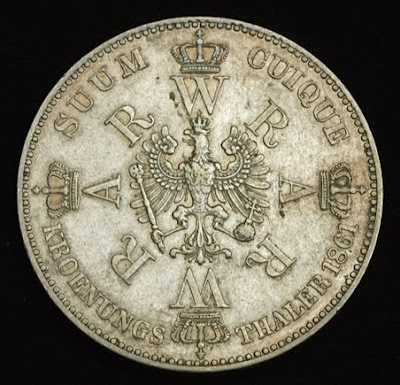 |
| German coins Prussian Coronation Thaler - Wilhelm King and Augusta Queen of Prussia |
 |
| Prussian Coronation Taler |
Obverse: Crowned busts of Wilhelm and Augusta as King & Queen of Prussia.
Legend: WILHELM KOENIG AUGUSTA KOENIGIN V. PREUSSEN
Reverse: Prussian Eagle, surrounded by WRA Letters (Monograms of the Royal Couple), the Ws are topped by crowns.
Legend: SUUM CUIQUE - KROENUNGS THALER 1861
Mint Place: Berlin (A)
Reference: KM-488, Kahnt 385, Thun 265, Davenport 778.
Weight: 18.40 gm
Diameter: 33 mm
Material: Silver
German Coins, German coinage, German silver coins, German States Coins, Coins of Germany, German Gold Coins, German commemorative coins, German Imperial Coins, Numismatic Collection, Coins of the German Empire, Coins of Germany best silver coins for investment, silver coins, German East Africa coins, old coins, coin collecting, rare coins, world coins, foreign coins, heritage coins, silver ira investment, silver bullion coins, silver coin collection investors, investment coins, antique coins, Unique Silver Coins, collectible coins, Münzen Deutschland, silbermünzen, Münzen aus Deutschland, Münzen Deutsches Kaiserreich.
Augusta of Saxe-Weimar-Eisenach
Princess Augusta of Saxe-Weimar-Eisenach (Augusta Marie Luise Katharina; 30 September 1811 – 7 January 1890) was the Queen of Prussia and the first German Empress as the consort of William I, German Emperor.
William I, German Emperor
William I, also known as Wilhelm I (full name: William Frederick Louis, German: Wilhelm Friedrich Ludwig, 22 March 1797 – 9 March 1888), of the House of Hohenzollern was the King of Prussia (2 January 1861 – 9 March 1888) and the first German Emperor (18 January 1871 – 9 March 1888). Under the leadership of William and his Minister President Otto von Bismarck, Prussia achieved the unification of Germany and the establishment of the German Empire. Despite his long support of Bismarck as Minister President, however, William held strong reservations about some of Bismarck's more reactionary policies, including his anti-Catholicism and tough handling of subordinates. Contrary to Bismarck, William was described as polite, gentlemanly, and while a staunch conservative, more open to certain classical liberal ideas than his grandson Wilhelm II.
On 2 January 1861 Frederick William died and William ascended the throne as William I of Prussia. In July a student from Leipzig tried to assassinate William, but he was only lightly injured. Like Frederick I of Prussia, William travelled to Königsberg and there crowned himself at the Schlosskirche. William chose the anniversary of the Battle of Leipzig, 18 October, for this event, which was the first Prussian crowning ceremony since 1701 and the only crowning of a German king in the 19th century.